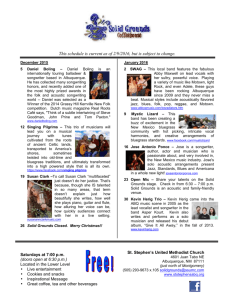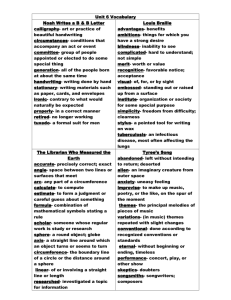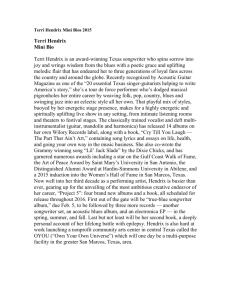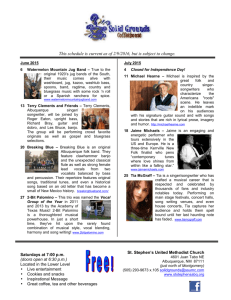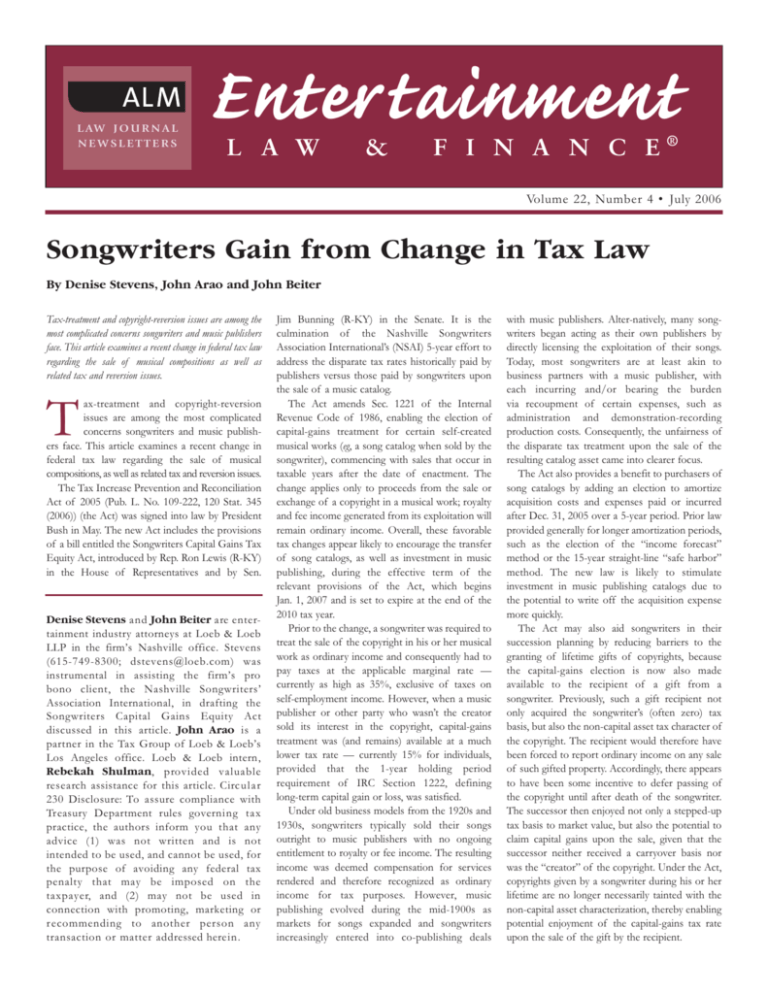
L AW J O U R N A L
NEWSLETTERS
Entertainment
L A W
&
F I N A N C E®
Volume 22, Number 4 • July 2006
Songwriters Gain from Change in Tax Law
By Denise Stevens, John Arao and John Beiter
Tax-treatment and copyright-reversion issues are among the
most complicated concerns songwriters and music publishers
face. This article examines a recent change in federal tax law
regarding the sale of musical compositions as well as
related tax and reversion issues.
T
ax-treatment and copyright-reversion
issues are among the most complicated
concerns songwriters and music publishers face. This article examines a recent change in
federal tax law regarding the sale of musical
compositions, as well as related tax and reversion issues.
The Tax Increase Prevention and Reconciliation
Act of 2005 (Pub. L. No. 109-222, 120 Stat. 345
(2006)) (the Act) was signed into law by President
Bush in May. The new Act includes the provisions
of a bill entitled the Songwriters Capital Gains Tax
Equity Act, introduced by Rep. Ron Lewis (R-KY)
in the House of Representatives and by Sen.
Denise Stevens and John Beiter are entertainment industry attorneys at Loeb & Loeb
LLP in the firm’s Nashville office. Stevens
(615-749-8300; dstevens@loeb.com) was
instrumental in assisting the firm’s pro
bono client, the Nashville Songwriters’
Association International, in drafting the
Songwriters Capital Gains Equity Act
discussed in this article. John Arao is a
partner in the Tax Group of Loeb & Loeb’s
Los Angeles office. Loeb & Loeb intern,
Rebekah Shulman, provided valuable
research assistance for this article. Circ u l a r
230 Disclosure: To assure compliance with
Treasury Department rules governing tax
practice, the authors inform you that any
advice (1) was not written and is not
intended to be used, and cannot be used, for
the purpose of avoiding any federal tax
penalty that may be imposed on the
taxpayer, and (2) may not be used in
connection with promoting, marketing or
r ecommending to another person any
transaction or matter addressed herein.
Jim Bunning (R-KY) in the Senate. It is the
culmination of the Nashville Songwriters
Association International’s (NSAI) 5-year effort to
address the disparate tax rates historically paid by
publishers versus those paid by songwriters upon
the sale of a music catalog.
The Act amends Sec. 1221 of the Internal
Revenue Code of 1986, enabling the election of
capital-gains treatment for certain self-created
musical works (eg, a song catalog when sold by the
songwriter), commencing with sales that occur in
taxable years after the date of enactment. The
change applies only to proceeds from the sale or
exchange of a copyright in a musical work; royalty
and fee income generated from its exploitation will
remain ordinary income. Overall, these favorable
tax changes appear likely to encourage the transfer
of song catalogs, as well as investment in music
publishing, during the effective term of the
relevant provisions of the Act, which begins
Jan. 1, 2007 and is set to expire at the end of the
2010 tax year.
Prior to the change, a songwriter was required to
treat the sale of the copyright in his or her musical
work as ordinary income and consequently had to
pay taxes at the applicable marginal rate —
currently as high as 35%, exclusive of taxes on
self-employment income. However, when a music
publisher or other party who wasn’t the creator
sold its interest in the copyright, capital-gains
treatment was (and remains) available at a much
lower tax rate — currently 15% for individuals,
provided that the 1-year holding period
requirement of IRC Section 1222, defining
long-term capital gain or loss, was satisfied.
Under old business models from the 1920s and
1930s, songwriters typically sold their songs
outright to music publishers with no ongoing
entitlement to royalty or fee income. The resulting
income was deemed compensation for services
rendered and therefore recognized as ordinary
income for tax purposes. However, music
publishing evolved during the mid-1900s as
markets for songs expanded and songwriters
increasingly entered into co-publishing deals
with music publishers. Alter-natively, many songwriters began acting as their own publishers by
directly licensing the exploitation of their songs.
Today, most songwriters are at least akin to
business partners with a music publisher, with
each incurring and/or bearing the burden
via recoupment of certain expenses, such as
administration and demonstration-recording
production costs. Consequently, the unfairness of
the disparate tax treatment upon the sale of the
resulting catalog asset came into clearer focus.
The Act also provides a benefit to purchasers of
song catalogs by adding an election to amortize
acquisition costs and expenses paid or incurred
after Dec. 31, 2005 over a 5-year period. Prior law
provided generally for longer amortization periods,
such as the election of the “income forecast”
method or the 15-year straight-line “safe harbor”
method. The new law is likely to stimulate
investment in music publishing catalogs due to
the potential to write off the acquisition expense
more quickly.
The Act may also aid songwriters in their
succession planning by reducing barriers to the
granting of lifetime gifts of copyrights, because
the capital-gains election is now also made
available to the recipient of a gift from a
songwriter. Previously, such a gift recipient not
only acquired the songwriter’s (often zero) tax
basis, but also the non-capital asset tax character of
the copyright. The recipient would therefore have
been forced to report ordinary income on any sale
of such gifted property. Accordingly, there appears
to have been some incentive to defer passing of
the copyright until after death of the songwriter.
The successor then enjoyed not only a stepped-up
tax basis to market value, but also the potential to
claim capital gains upon the sale, given that the
successor neither received a carryover basis nor
was the “creator” of the copyright. Under the Act,
copyrights given by a songwriter during his or her
lifetime are no longer necessarily tainted with the
non-capital asset characterization, thereby enabling
potential enjoyment of the capital-gains tax rate
upon the sale of the gift by the recipient.
July 2006
LJN’s Entertainment Law & Finance
Before finalizing the bill introduced as the
Songwriters Capital Gains Tax Equity Act,
legislative staff added language to preserve existing
provisions of the tax code designed to guard
against excessive valuation of charitable contributions.
Accordingly, for musical-composition property in
the hands of a songwriter, or recipient of a
non-charitable gift from a songwriter who donates
the property to a charity, the charitable-contribution
tax deduction is limited to the lesser of fair-market
value or tax basis, as was the case under prior law.
DETERMINING THE
HOLDING PERIOD
One issue arising out of the Act that may
require clarification is the determination of the
holding period — ie, for calculation of the 1-year
long-term capital gains holding requirement of
IRC Sec. 1222 — of a copyright recovered by a
songwriter (or a songwriter’s heirs) pursuant to the
termination-of-transfer provisions of the
Copyright Act. For example, under Sec. 203(a) of
the Copyright Act, a songwriter or songwriter’s
heirs may, by sending notice within specified time
limits and under specified conditions, elect to
terminate certain post-1977 grants by the
songwriter of rights in a copyright, effective during
a period of 5 years from the end of 35 years after
the date of execution of the original grant.
Although the right to receive the future return of
the granted rights “vests” in the songwriter (or the
applicable heirs) upon the sending of notice, the
reversion does not become effective until after a
2-10-year period following delivery of such notice.
Usually, the holding period of a capital asset is
computed from the date of acquisition. The
holding period of rights in a copyright covered by
a terminated grant ought to begin no later than the
date following the effective date of the reversion.
But on the earlier vesting date, a songwriter may
have commenced the counting of the holding
period of rights that qualify for an election under
IRC Sec. 1221(b)(3), or which may otherwise
qualify as a capital asset under the analysis
discussed below. This issue is certainly uncharted
territory in that the applicable holding period
wasn’t previously relevant to the sale of a copyright
by a songwriter.
Examining potentially analogous property rights
may be useful in considering the character of a
reverted copyright prior to the effective date of the
reversion. Given that the vested “right” to future
receipt of a reverted copyright interest may be sold
prior to the effective date of the reversion (albeit
under limited circumstances under Sec. 203(b)), it
is apparent that the vested right constitutes some
form of property right. Is this property right
acquired upon vesting in the nature of an option?
Or perhaps it is so closely related to the property
to be ultimately recovered on the reversion’s
effective date that it rises to the level of the
recovered property itself, as in the case of a
remainder interest in property.
A factor distinguishing the provisions of Sec.
203 from the operation of an option is that once
the notice and related filing requirements of Sec.
203 are met to effect the vesting of the right to
receive the future reversion of a copyright covered
by a terminated grant, no further “exercise”
or other affirmative action is necessary to
trigger the actual return of the copyright. This
vested right solely awaits the passage of time to
ripen into possession.
It is well established that property obtained
through exercise of an option is “acquired” for
purposes of measuring the federal tax code’s
holding period when the option is exercised, not
when the option is granted. But two separate
The Act may also aid
songwriters in their
succession planning
by reducing barriers
to the granting of lifetime
gifts of copyrights.
holding periods may be relevant: The option itself
has a holding period that runs from the date of its
grant; and the property that is the subject of the
option, the holding period for which doesn’t begin
until it is acquired pursuant to the exercise of the
option. Given that the holding clock starts anew
upon exercise of the option, the sale of property
acquired upon option exercise prior to satisfaction
of the 1-year holding requirement would then be
treated as short-term capital gain or loss. If these
rules were determined to be applicable to the sale
of musical compositions, a recovered copyright
interest sold after the effective date of a reversion
must have been held for at least 1 year before
qualifying as a long-term capital asset.
One approach often utilized for opportunities
to sell property for which a taxpayer holds an
option for more than 1 year is for the taxpayer to
sell the option itself, rather than to exercise the
option and then immediately sell the optioned
property. This way, the resulting gain could be
considered long-term capital gain rather than
short-term gain. The determination of the
application of such rules may provide incentive for
a motivated seller of a terminated interest to
pursue negotiation with the original grantee, rather
than wait the year following the effective date of
reversion before exploring the open market.
VESTED REMAINDER
INTEREST ANALOGY
A vested remainder interest is a property right
that hasn’t yet ripened into full ownership and
possession. For such remainder interests, the
holding period for long-term capital-gain eligibility
generally begins upon the vesting of the interest
and continues without interruption upon the
taking of possession of the property. In Helvering v.
Gambrill, 313 U.S. 11 (1941), the U.S. Supreme
Court found, in interpreting a holding-period rule
under the Revenue Act of 1928 for capital gains
and losses, that property held by a taxpayer
included not only full ownership but also any
interest, such as property that a taxpayer received
as a remainder under a trust, whether vested,
contingent or conditional. Accordingly, if a vested
remainder interest were determined to be the
applicable analogy, the calculation of the holding
period for the rights covered by a terminated
copyright grant would begin upon the vesting date,
with “possession” to ripen upon the later effective
date of the reversion. Consequently, sale of
the terminated copyright interest immediately
following the effective reversion date would
qualify the seller to claim long-term capital-gain
treatment of the proceeds, rather than require the
seller to wait out the 1-year holding period.
Because resolution of the holding-period issue
may influence the timing of further transfers of
reverted copyrights, it may be appropriate for a
future technical corrections bill or a Treasury ruling. However, the capital-gains provision of the
new Act is currently only effective for sales or
transfers on or before Jan. 1, 2011, which is prior
to the first possible effective date of Jan. 1, 2013,
for a termination of transfer under Sec. 203.
Accordingly, capital-asset characterization of such
reverted copyright interests in the hands of the
creator beyond this expiration date will presume
that the applicable provisions of the new act are
renewed or extended for the relevant period.
Assuming such renewal, resolution of the holding
issue will be particularly relevant to the sale by the
creator of reverted rights initially sold or
exchanged during the first 1-year period following
the effective date. Unless the holding period relates
back to the vesting date, the proceeds from such a
sale couldn’t qualify for long-term capital-gain
treatment. A determination that the holding date
doesn’t begin until after the effective date of
copyright reversion may influence a delay in the
resale of the reverted copyright interests.
—❖—
This article is reprinted with permission from the JULY
2006 edition of the LAW JOURNAL NEWSLETTERS ENTERTAINMENT LAW & FINANCE. © 2006 ALM
Properties, Inc. All rights reserved. Further duplication
without permission is prohibited. For information, contact ALM Reprint Department at 800-888-8300 x6111
or visit www.almreprints.com. #055081-10-06-0009

